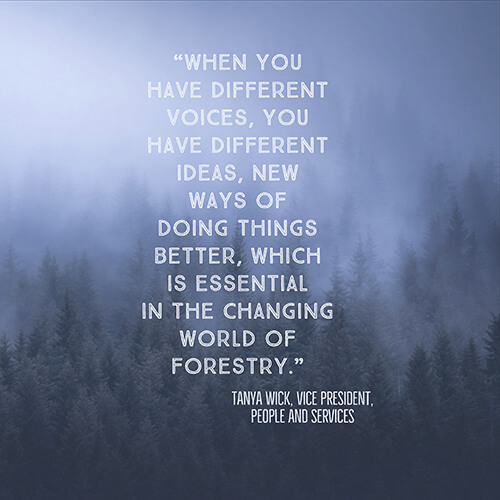In November, the Canadian Institute of Forestry announced the first national public-private partnership on gender equality in the forestry sector in Canada. The goal of the three-year initiative is to develop a National Action Plan on gender equality in forestry to increase the number of women in the industry. As part of the initiative, a multi-stakeholder advisory committee has been established to guide the creation of the plan.
Tolko’s Tanya Wick, Vice President of People and Services, has been selected as one of the members of the National Steering Committee for Gender Equality in Canada’s Forest Sector. On a snowy winter morning in Vernon, we sat with Tanya to talk about the Committee, what her membership means to her from a personal and professional perspective, and what it was like being in the room for the first Committee get-together which was recently held in Ottawa.
 It’s just after 9 a.m. Tanya puts her file away in her meticulously organized desk and turns to face us with a smile, her green eyes beaming from underneath the brim of a black fedora that covers her red hair. We already have the impression she’s someone who gets a lot done because she knows exactly where everything is and where everything is going at any given moment.
It’s just after 9 a.m. Tanya puts her file away in her meticulously organized desk and turns to face us with a smile, her green eyes beaming from underneath the brim of a black fedora that covers her red hair. We already have the impression she’s someone who gets a lot done because she knows exactly where everything is and where everything is going at any given moment.
Tolko’s first female Vice President, Tanya is no stranger to meeting goals and objectives. She’s been exceeding expectations her whole life. Now, as she moves into the next phase of her career, she has set an impressive goal for herself and she is determined to meet it. Tanya wants to make the forest industry more welcoming for women by “ensuring women who have great skills and ability are promoted and seen as role models for the industry.” She wants more women to join her in finding success in forestry and is focused on changing the mindset that the forest industry isn’t a place for women, or promoting women simply because they are women.
From her perspective, taking on change this way puts the accountability for professional and industry success on both employers and employees. “Employers have to recognize and change their unconscious biases and establish safe and inclusive workplaces while employees have to take ownership of their careers and tackle their personal and professional barriers to success.”
It’s obvious she’s passionate about the work. Tolko has taken a leading role in the industry; working since 2016 to raise awareness of the importance of having a workforce that includes an abundance of diverse cultures, voices, and sexes. “It makes sense,” says Tanya. “When you have different voices, you have different ideas, new ways of doing things better, which is essential in the changing world of forestry.”
As an active member on the Steering Committee, Tanya’s hard work is paying off, having received the first FPAC Women in Forestry Award of Excellence earlier this year.
And how will the committee help fulfill her vision for the forest industry? It’s early days yet, but Tanya feels the group has their hearts and heads in the right place.
“The first meeting was inspiring,” she says. “The room was filled with very different people who had a great deal of shared experience and a clear goal: we want to make things better.”
And, what came out of the first meeting? A list of key outputs the Committee wants to see tackled in the National Action Plan includes:
- Demonstrating to other sectors what can be done and identifying barriers that can be eliminated across sectors;
- Recommendations for how to draw the best and brightest to the industry;
- Devising ways to secure industry-wide commitments on progressing women in forestry;
- Developing a practical approach that is seen as a necessary business strategy; and
- Securing equal opportunities for success for both men and women in the industry.
It’s an audacious agenda, but Tanya feels the right people are at the table to meet the objective.
“The goal for all of us is to create organizations where inclusiveness is embedded and is not seen an initiative,” she says. “This is a business issue. We already know companies with mixed gender Boards and senior management positions outperform those with all-male leadership. We are well aware we can only reach our company goals by having an engaged and diverse workforce of highly skilled people working together. “
For Tanya and the Committee, the result is a positive future state where women are actively and increasingly a part of the shared success of the industry.
“We want to inspire, build excitement and help women see the forest industry as an attractive workplace that recognizes their contributions and welcomes them across all roles.”
